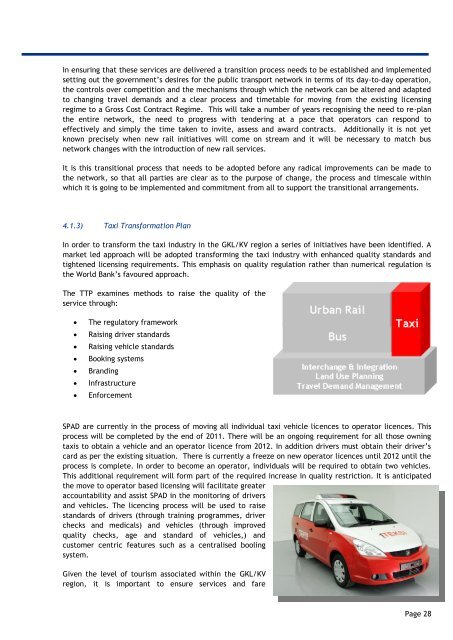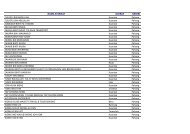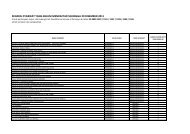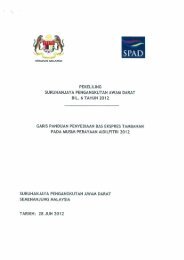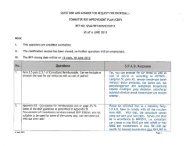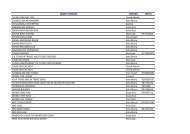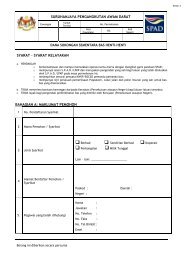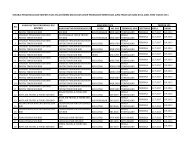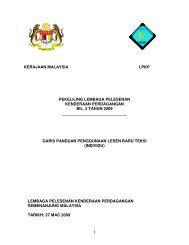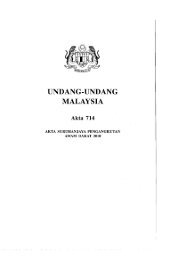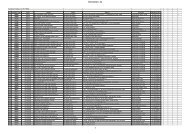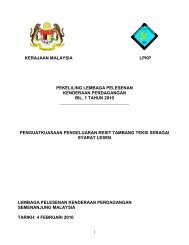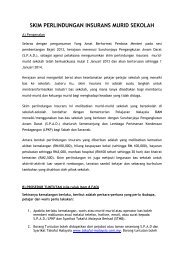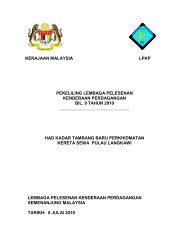Executive Summary - SPAD
Executive Summary - SPAD
Executive Summary - SPAD
Create successful ePaper yourself
Turn your PDF publications into a flip-book with our unique Google optimized e-Paper software.
In ensuring that these services are delivered a transition process needs to be established and implemented<br />
setting out the government‟s desires for the public transport network in terms of its day-to-day operation,<br />
the controls over competition and the mechanisms through which the network can be altered and adapted<br />
to changing travel demands and a clear process and timetable for moving from the existing licensing<br />
regime to a Gross Cost Contract Regime. This will take a number of years recognising the need to re-plan<br />
the entire network, the need to progress with tendering at a pace that operators can respond to<br />
effectively and simply the time taken to invite, assess and award contracts. Additionally it is not yet<br />
known precisely when new rail initiatives will come on stream and it will be necessary to match bus<br />
network changes with the introduction of new rail services.<br />
It is this transitional process that needs to be adopted before any radical improvements can be made to<br />
the network, so that all parties are clear as to the purpose of change, the process and timescale within<br />
which it is going to be implemented and commitment from all to support the transitional arrangements.<br />
4.1.3) Taxi Transformation Plan<br />
In order to transform the taxi industry in the GKL/KV region a series of initiatives have been identified. A<br />
market led approach will be adopted transforming the taxi industry with enhanced quality standards and<br />
tightened licensing requirements. This emphasis on quality regulation rather than numerical regulation is<br />
the World Bank‟s favoured approach.<br />
The TTP examines methods to raise the quality of the<br />
service through:<br />
<br />
<br />
<br />
<br />
<br />
<br />
<br />
The regulatory framework<br />
Raising driver standards<br />
Raising vehicle standards<br />
Booking systems<br />
Branding<br />
Infrastructure<br />
Enforcement<br />
<strong>SPAD</strong> are currently in the process of moving all individual taxi vehicle licences to operator licences. This<br />
process will be completed by the end of 2011. There will be an ongoing requirement for all those owning<br />
taxis to obtain a vehicle and an operator licence from 2012. In addition drivers must obtain their driver‟s<br />
card as per the existing situation. There is currently a freeze on new operator licences until 2012 until the<br />
process is complete. In order to become an operator, individuals will be required to obtain two vehicles.<br />
This additional requirement will form part of the required increase in quality restriction. It is anticipated<br />
the move to operator based licensing will facilitate greater<br />
accountability and assist <strong>SPAD</strong> in the monitoring of drivers<br />
and vehicles. The licencing process will be used to raise<br />
standards of drivers (through training programmes, driver<br />
checks and medicals) and vehicles (through improved<br />
quality checks, age and standard of vehicles,) and<br />
customer centric features such as a centralised booling<br />
system.<br />
Given the level of tourism associated within the GKL/KV<br />
region, it is important to ensure services and fare<br />
Page 28


